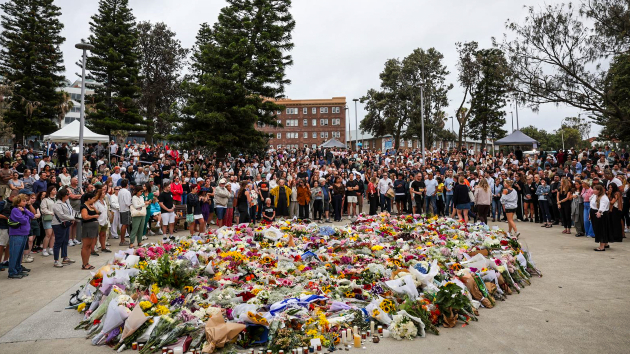Children in Rafah flying kites to forget war, as Israeli military escalation looms in Gaza
Written by ABC Audio ALL RIGHTS RESERVED on February 9, 2024
(RAFAH AND LONDON) — In the sand dunes above Rafah in southern Gaza, a ricochet of children’s laughter rings out, mixing with the unrelenting sound of Israeli reconnaissance drones. This odd combination can be heard most days as children from the tent city populated by the displaced gather to fly their kites, finding some joy amidst the horrors of war.
“We just forget everything, we make kites and fly them, we forget the bombing,” 12-year-old Oday Abu Odeh told ABC News. “When we sit at home, the sound of the reconnaissance planes annoys us all, but when all of us here fly kites, we don’t feel it.”
Oday said they make their kites from whatever scraps they can find and run to the sand banks above the encampment to fly them whenever they can.
Flying his kite brings, “freedom and happiness,” to 15-year-old Nael Muhammad Al-Najjar. “And we forget our worries,” he told ABC News.
For these children, they said flying kites is a welcome distraction from the grim reality of life in Rafah’s tent city.
Aid agencies estimate there are now 1.4 million people, or two-thirds of Gaza’s total population, displaced in this small town that borders Egypt. All are competing for the scant resources available amid the Israel-Hamas war. They pitch tents wherever they can.
“We have been suffering for more than five months from place to place, from place to place,” Filastin Jamal Abd el Hamid, who had been displaced from northern Gaza, told ABC News.
“They said a place was safe then they entered it. There is no safe place,” she said.
Many of the people camping here said they have been displaced several times since Hamas’ surprise terrorist attack in Israel on Oct 7. and the military response by Israel in Gaza. They said they are now living in fear the Israeli military will begin an incursion into Rafah after Prime Minister Benjamin Netanyahu announced plans to do so.
“It is impossible to achieve the war objective of eliminating Hamas and leaving four Hamas battalions in Rafah,” the Israeli Prime Minister’s Office said in a statement Friday. “On the other hand, it is clear that a massive operation in Rafah requires the evacuation of the civilian population from the combat zones.”
Netanyahu said this is why he directed the Israel Defense Forces and the defense establishment to bring to the cabinet a dual plan for both the evacuation of the population and the disbanding of the battalions.
“We honestly don’t know what will happen to us next,” Feryal Mahmoud Al-Najjar, who has been displaced many times, told ABC News. “We came here, to the end of the world, at the Egyptian border. This is the last place we can reach. After that, we don’t know where to go.”
With much of central and northern Gaza reduced to rubble, questions are being asked about where these people can realistically be evacuated to.
“An expansion of hostilities could turn Rafah into a zone of bloodshed and destruction that people won’t be able to escape. There is nowhere left for people to flee to,” Angelita Caredda, the Norwegian Refugee Council’s Middle East and North Africa Regional Director, said in a statement to ABC News.
“There are no homes or anything, it is all scrubland and tents and displaced people. Why will they enter and what will they do? Will they beat us?” Abd el Hamid asks.
Netanyahu’s plans to advance on Rafah have led to calls for restraint from the Biden administration and aid agencies alike.
“There are a lot of innocent people who are starving, a lot of innocent people who are in trouble and dying, and it’s gotta stop,” President Joe Biden told reporters Thursday, calling the Israeli military’s attack on Gaza “over the top.”
“There’s a lot of displaced people there and the Israeli military has a special obligation as they conduct operations there or anywhere else, to make sure that they’re factoring in protection for innocent civilian life,” White House national security spokesperson John Kirby told reporters Thursday.
Kirby, however, said the U.S. had not seen any indication the Israelis were about to launch a major operation on Rafah, adding, “given the circumstances and the conditions there that we see right now, we think a military operation at this time would be a disaster for those people.”
“An escalation of the fighting in Rafah, which is already straining under the extraordinary number of people who have been displaced from other parts of Gaza, will mark another devastating turn in a war that has reportedly killed over 27,000 people – most of them women and children,” UNICEF Executive Director Catherine Russell said in a statement Friday.
In the Gaza Strip, at least 27,947 people have been killed, and 67,459 others have been wounded by Israeli forces since Oct. 7, according to Gaza’s Hamas-controlled Ministry of Health.
In Israel, at least 1,200 people have been killed and 6,900 others have been injured by Hamas and other Palestinian militants since Oct. 7, according to Israeli officials.
While many in Rafah brace themselves for this incursion the kite runners carry on.
“Now we’ve made this kite we’ve forgotten our worries,” 12-year-old Fawzi Muhammad Fawzi Al-Najjar told ABC News. “Now we pass all our free time flying kites because there are no schools, we don’t read, we don’t practice sports or anything else.”
But they, too, want the war to end.
“We want a solution to come back. We want a cease-fire,” Oday said. “We want to live in peace, to return to our homes alive, we want to return to schools.”
A sentiment his friend Nael Muhammad Al-Najjar shares, “I wish we could go back to our homes, go back to our studies, and our old days.”
Copyright © 2024, ABC Audio. All rights reserved.






